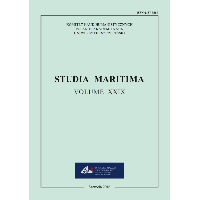Ślady żeglugi po morzu martwym w tekstach antycznych (IV BC–II AC)
Traces of Navigation in the Dead Sea in Ancient Texts (4th BC–AD 2nd)
Author(s): Piotr BriksSubject(s): Archaeology, Ancient World, Financial Markets
Published by: Wydawnictwo Naukowe Uniwersytetu Szczecińskiego
Keywords: Dead Sea; Israel; antiquity; navigation;
Summary/Abstract: For almost 100 years there has been no navigation in the Dead Sea. Its two banks are occupied by two states – Israel and Jordan – which do not maintain close relations with one another; yet, there are no lumps of asphalt any longer, and fishery has never existed here for obvious reasons. A research boat appears here sometimes, and that is it. That is why, more and more information on the archaeological discoveries testifying a rich history of the Dead Sea navigation causes such a big surprise. As it seems, it had been developing in the most intensive form between the 4th century BC and the AD 2nd century. The paper analyses nine ancient texts, which mentioned – in a more or less direct way – the navigation in the Dead Sea in the period in question: – three reports by Hieronymus of Cardia (4th–3rd centuries BC) kept in the version written by Diodorus of Sicily (1st century BC), – a note by Strabo (about 63 BC – AD 24) in his ‘Geography’, where he quotes a description of extracting asphalt coming from Posidonius of Rhodes (about 135–50 BC), – two texts by Titus Flavius Josephus (AD 37–94), – the description by Tacitus (about AD 55–120); – the text written by Marcus Junianius Justinus (AD 2nd–3rd centuries) based on Gnaeus Pompeius Trogus (the end of the 1st century BC), – a fragment of the letter written by Simon bar Kokhba (Hebrew: כוכבא בר שמעון ( (AD 2nd century), in which he writes about the goods kept on ships in the port of .(יִדֶּג ןיֵע :Hebrew (Gedi Ein The article also includes a short description of the iconographic information that has survived and a summary of the current state of archaeological research concerning the period the above mentioned written sources deal with.
Journal: Studia Maritima
- Issue Year: 29/2016
- Issue No: 1
- Page Range: 43-61
- Page Count: 19
- Language: Polish

